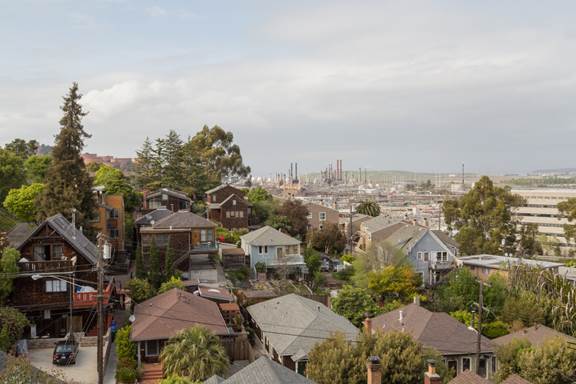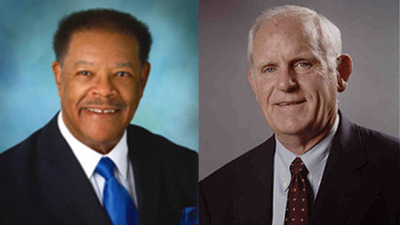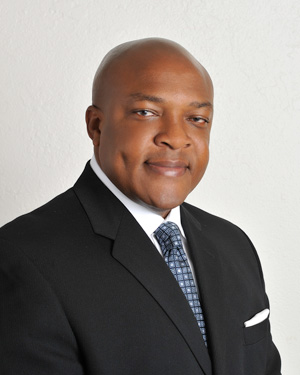| |
KQED - Richmond Mayoral Race May Decide City’s Ideological Future

The Point Richmond section of the East Bay city of Richmond, near Chevron's refinery. (Josh Cassidy/KQED News)
By Isabel Angell Nov 4, 2014
There’s a mayoral race in Richmond this election season, and current Mayor Gayle McLaughlin is termed out.
McLaughlin, the first Green Party candidate elected mayor of a major city, is part of the Richmond Progressive Alliance, or RPA.
That’s the group behind a lot of attention-getting stories out of Richmond recently, like the soda tax bill and the attempt to use eminent domain to buy up underwater mortgages. But no one from the RPA is running for mayor this time around. Instead, two long-time city councilmen are squaring off: Nat Bates and Tom Butt.

Nat Bates and Tom Butt square off in the Richmond Mayors race.
Bates is 82 years old, and part of an established faction of pro-business, moderate politicians in the city. He served on the council in the ’60s and ’70s, and was re-elected in 1995. Bates is heavily supported by Chevron in this race, which has a large refinery in Richmond. The company would like to see someone more sympathetic at the head of the City Council, after McLaughlin took a decidedly adversarial stance against the oil giant.
Butt is 72, and he’s been on the council since 1995. McLaughlin and the RPA are endorsing him in this race because he often votes with the progressives on the council, even if he’s not officially part of the alliance. He has often worked on compromising with Chevron, most recently on the company’s $1 billion refinery modernization project. In that case, he and two other council members helped secure a $90 million community benefits package from the company in exchange for the votes to approve the project.
The two men have been on the City Council for a combined 54 years.
“The candidates in some ways are more similar than not,” said Robert C. Smith, a political science professor at San Francisco State. He’s been following Richmond politics for decades. “So it’s not like to elect either one is going to bring about change, so to speak.”
The fresh face in this race is Uche Uwahemu, a businessman and former social worker.
“They’ve had their opportunity to lead,” Uwahemu said, referring to Bates and Butt. “You can’t keep recycling the same folks all the time.”
 Candidate Uche Justin Uwahemu. (Courtesy Uche for Richmond Mayor 2014). Candidate Uche Justin Uwahemu. (Courtesy Uche for Richmond Mayor 2014).
Uwahemu has got a lot of ideas, from a technical high school that teaches computer skills to a technology incubator that would fund tech startups in Richmond. But when it comes to funding those ideas, he’s a bit fuzzy. He also wants to beef up Richmond’s port, which he says is underutilized.
But Uwehamu has little campaign cash to spend, and really, little chance of winning this race. Bates, on the other hand, is getting a big chunk of funds from a $1.3 million super PAC created by Chevron to influence Richmond politics.
Chevron has poured a total of $3 million into super PACs. A lot of that money is going to negative campaigning against McLaughlin –who’s running for council — and the other RPA council candidates.
“I think if Bates and those forces win, it will be evidence the money made the difference,” Smith said.
Bates is running on a pro-business platform and promises to get Richmond out of its $7 million deficit, even if it means laying off city workers.
“You can’t move a city and you can’t operate a city if you have that kind of tremendous deficit. It’s just like a household,” he explained.
In years past Bates has attracted support from many of Richmond’s African-American voters, who make up 14 percent of the city’s registered voters — like Frances Adams, an elementary school teacher.
“He’s always been there when we need things for the school, he’s always been there to come and talk to the children at school, and I feel that he’s served the city of Richmond very well,” Adams said after a debate.
Butt has prioritized building and maintaining parks, preserving historical buildings and adding bike lanes.
“These are all things that make Richmond attractive to businesses, attractive to residents and make Richmond thrive — at least thrive better than they would without them,” he said.
One of Butt’s supporters, Jessie West, agreed.
“The progressive government we’ve had these last years has done wonderful things for Richmond and we’re really on a roll,” she said.
She said that if Bates gets elected, the progressive agenda will fade.
Chevron has been attacking that agenda relentlessly with messages on billboards, the airwaves and mailboxes.
The corporation would like to see McLaughlin fail at her bid for City Council and for Bates to take over as mayor.
But residents have seen their city improve under McLaughlin, as the economy has picked up. Unemployment has dropped to 10 percent, though it’s still higher than the rest of the Bay Area. And the crime rate has dropped. 2013 had the fewest homicides in over 30 years.
There is really no hot-button issue this time around, like the soda tax that failed two years ago. Smith predicts turn out will be low. And that usually benefits the progressives.
“It’s not clear where that vote comes from in terms of ethnically, class or whatever,” Smith said about the RPA’s constituency. “But it is clear that on the basis of past elections that they have a pretty good grass-roots mobilization get-out-the-vote campaign.”
Smith says that if you look at Richmond’s politics over time, the rise of McLaughlin and her Richmond Progressive Alliance has actually been surprising. He says the winner of this election will signify whether the city wants to continue this progressive agenda, or return to a more moderate, pro-business leadership.
|
|

